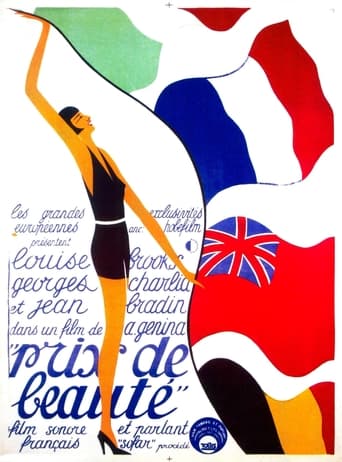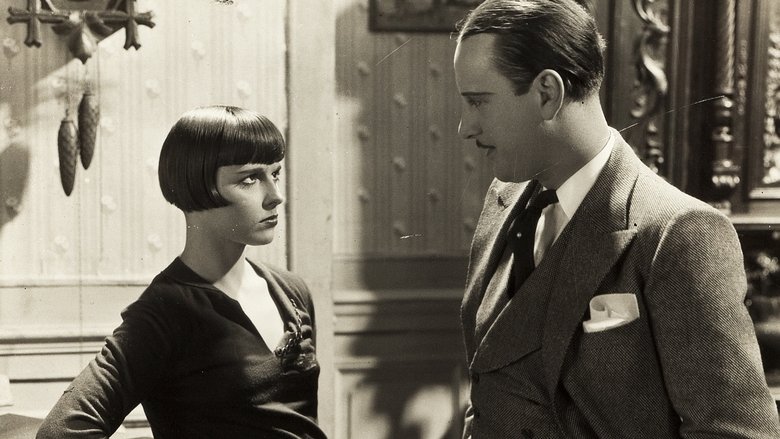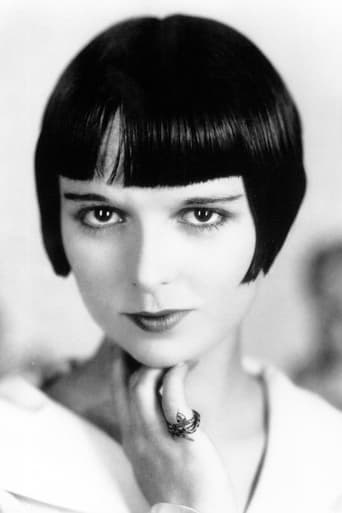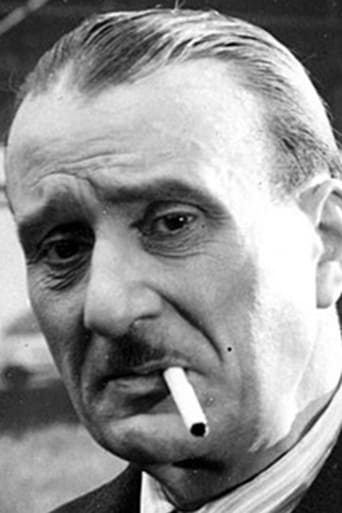

Miss Europe (1930)
Lucienne, typist and gorgeous bathing beauty, decides to enter the 'Miss Europe' pageant sponsored by the French newspaper she works for. She finds her jealous lover Andre violently disapproves of such events and tries to withdraw, but it's too late; she's even then being named Miss France. The night Andre planned to propose to her, she's being whisked off to the Miss Europe finals in Spain, where admirers swarm around her. Win or lose, what will the harvest be?
Watch Trailer
Cast
Reviews
I like the storyline of this show,it attract me so much
A movie that not only functions as a solid scarefest but a razor-sharp satire.
By the time the dramatic fireworks start popping off, each one feels earned.
All of these films share one commonality, that being a kind of emotional center that humanizes a cast of monsters.
A wonderful surprise! I've always heard that Louise Brooks' follow-up to her two star-making hits with G.W. Pabst was a pleasant but inconsequential swan song. I thought it was very good, with an absolutely brilliant performance by Brooks. Co-written by Pabst and Rene Clair, this is basically a silent movie with overdubbed sound. Thus, the director is able to avoid the stodginess that comes with early sound filmmaking. He uses a very intimate, fluid style with the camera drifting through crowds to discover the beautiful Ms. Brooks' face. The one big problem the film has is that Brooks' love interest (Georges Charlia) is so totally unworthy of Brooks from the start that you can never come close to sympathizing with him. But that's not that important, really. Brooks plays Charlia's fiancée. He forbids her from entering the Miss France contest, but she's already done so. When she wins the opportunity to compete for Miss Europe, she chooses to disobey him. When she wins the competition, the fame and male attention drives her back to Charlia. But poor, married life soon seems much worse to her. The film is extremely worthwhile just for the expressions of Brooks' face alone. Though she has words, as dubbed in by a French actress, she doesn't need them. Her smiles seem created by a filmmaking Leonardo, and her pains are ours. Lulu could never have survived in the talkies (and I've seen the proof, a short film she made with Roscoe Arbuckle shortly after this one), and perhaps the loss of Brooks is the greatest of the talking picture era.
Prix de Beauté is an interesting late Louise Brooks vehicle. Initially much lighter in tone than Pandora's Box or Diary of a Lost Girl, there is a sudden twist in the narrative at the end which changes the way in which one looks at the entire film.Brooks here is at her best, though she is playing a somewhat more sympathetic character than those she portrayed in her two best known films. Amusingly, her character, Lucienne, is referred to as Lulu in the opening minutes of the film, recalling her previous year's success. Although her voice is overdubbed in French, Brooks carries the role convincingly with her masterful use of facial expressions, learned during her years making silents.The opening scenes show her fiancé, Andre, bullying a work colleague yet this is depicted in a slapstick manner, leading one to think the film will be a comedy.Andre is depicted from the outset as a largely unsympathetic character due to his domineering nature but there is a slight nuance to the performance and one feels increasing sympathy as it is shown that Brooks' character is more interested in the glamour of her new career than remaining loyal to him and her fickleness in love allows one to understand the turn events take at the end.One interesting technique used throughout the film is to contrast scenes of the organic (Brooks and the other pageant contestants) with extreme close-ups of the mechanical (such as the printing press, the piano and various clocks.) The scene of the bird trapped in the cage may be a cliché now but it works effectively in this film as a symbol of Lucienne's feelings of being trapped in a drab life by Andre.Sound is not used in a particularly innovative way in this film but the score is delightful and suits the atmosphere of the story. In particular, the early jazz music and bal-musette piece during the ballroom scene are lovely.The film is well paced and tension builds quickly, though not abruptly, as the mood changes towards the end. The lighting becomes almost noir-like and the scenes of Lucienne dying whilst her image lives on, happily, on the screen, are a wonderfully ironic touch.Overall, this film will be of most interest to fans of Brooks and connoisseurs of early French cinema. It falls short of being a masterpiece but it is well-executed and intriguing, making it a solid work that can be enjoyed by all.
I think I truly love this film . "Prix de Beaute" was originally a silent film but later dubbed into French in 1930. Despite having someone else's voice dubbed over hers, this remains a stunning tour de force for Louis Brooks. The fact that her singing voice is dubbed by the legendary Edith Piaf helps to mollify us purists about the dubbing deception. This is the story of Lulu and we first see her at a resort with her macho boyfriend, Andre (Georges Charlia) and their friend Antonin (Augusto Bandini). Lulu enters the frame as a pair of legs: we see her inside the car changing into her bathing costume. Lulu is very free with showing off her body and this does not sit well with the irksome Andre. When Lulu considers applying for the title of 'Miss Europe' we know that a happy ending is not going to be sitting at the end of Easy Street. The film seems to focus a lot on men ogling beautiful women. We see plenty of bathing beauties and the reactions of the men staring at them. But at the center of it all is the magnificent Louise Brooks. If you don't mind watching films from the bygone eras, then consider checking out this one. Louise Brooks is not a name that most average movie buffs may readily know but as soon as you see her you will be mesmerised and you'll want to know more. Also check her out in 'Pandora's Box' if you can find it.Be wary of the US Kino DVD release. I don't know if their projection speed is correct. A lot of the scenes appear to be shown at too fast a speed. This may have been the way they were shot. I don't know. But since it's the only way to see this film, it's worth swallowing that one minor bitter pill.
Cult icon Louise Brooks was never better than she is in this early French talkie, which turned out to be her last staring role.While Brooks' two German films, "Pandora's Box" and "Diary of a Lost Girl" are far better known in the US, "Prix" is clearly just as good a film, in my view much better than the butchered "Diary.""Prix" tells a simple story of a working class French girl who dreams of a better life and sets out to get it by entering a beauty pageant. Rising all the way to the position of "Miss Europe," she then gives it all up for the working class man she loves. But she finds that life as a housewife in a dreary walk up flat is killing her soul, as is her jealous husband, and eventually she walks out when she gets a chance at a film contract. But her husband won't let her go and the film builds to a tragic ending that is still considered one of the best climatic scenes in film history.This film features strong direction, extremely exciting location photography by famed cinematographer (and later director) Rudolph Mate and an intelligent,Spartan script by Rene Clair.But the wonder of the film is Brooks herself. Although her voice is dubbed by a French actress (Brooks didn't speak French) the film was initially planned as a silent and in large chunks of it, her character doesn't speak, anyway. But Brooks' fortune was her face and what she could do with it and there are few in film history who could do more. While there are some echos of silent film technique in her work, she was so far ahead of her time that most of her performance seems as fresh today as it did in 1929. Whether she is the unhappy girl being dragged by her boyfriend through a working class mob at a carnaval, or the depressed housewife staring into a canary's cage and feeling just as trapped, Brooks is a revelation.But it is when she is happy in this film that Brooks simply leaps off the screen at you. In most of the still photos she shot over the years, Brooks doesn't smile, apparently because she'd promised herself not to ever wear one of those pasted on grins found on showgirls on stage. But when called upon in a film to express happiness, no one ever exceeded Brooks, who may be the most magnetic actress in film history.While "Pandora's Box" will always be her signature film, "Prix de Beaute" ranks a close second in my mind as the best film work of her career.


